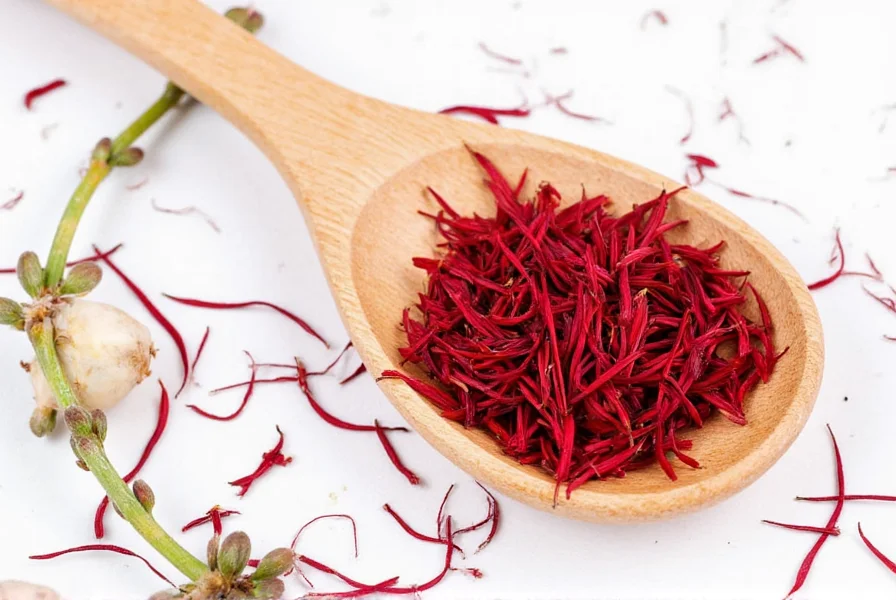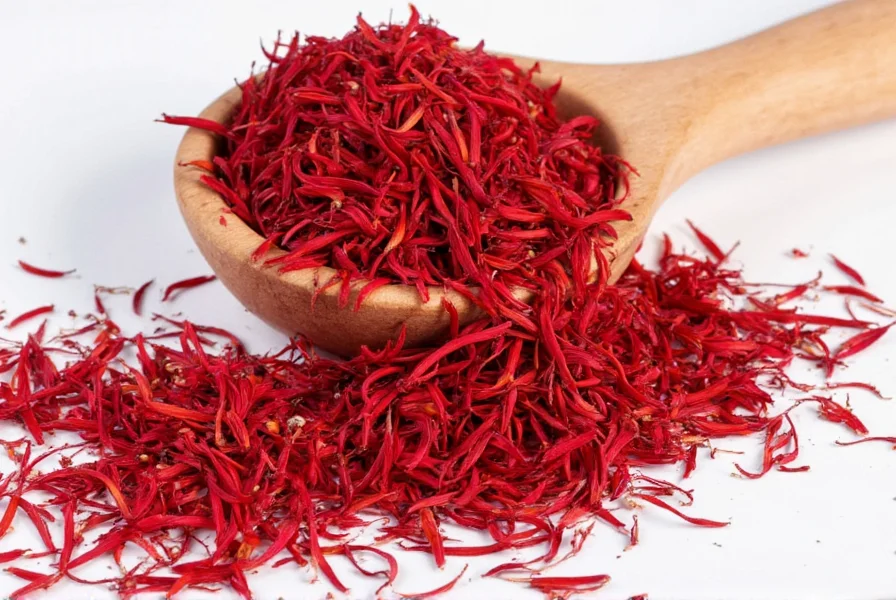Anxiety affects millions worldwide, driving interest in evidence-based natural alternatives alongside conventional treatments. Saffron (Crocus sativus), the world's most expensive spice, has emerged as a promising candidate in anxiety management research. This comprehensive review examines what current scientific evidence reveals about saffron for anxiety, separating established findings from speculation.
The Science Behind Saffron and Anxiety Relief
Modern research focuses on saffron's two primary bioactive compounds: crocin (responsible for its red color) and safranal (providing its distinctive aroma). These compounds demonstrate significant neurochemical effects relevant to anxiety regulation:
- Serotonin modulation - Saffron appears to inhibit serotonin reuptake similar to SSRIs, but through different mechanisms
- GABA enhancement - Safranal may increase GABA activity, producing calming effects
- Anti-inflammatory properties - Chronic inflammation correlates with anxiety disorders
- Oxidative stress reduction - Protects neural pathways involved in emotional regulation
A 2022 meta-analysis published in Phytomedicine reviewed 12 clinical trials involving 1,032 participants with mild-to-moderate anxiety. Researchers found saffron supplementation (typically 30mg twice daily of standardized extract) demonstrated statistically significant anxiety reduction compared to placebos, with effects appearing within 4-6 weeks.
| Study | Participants | Dosage | Duration | Key Finding |
|---|---|---|---|---|
| Hausenblas 2021 | 241 adults | 56mg/day | 8 weeks | 31% greater anxiety reduction vs placebo |
| Kianpour 2018 | 60 women | 30mg twice daily | 6 weeks | Comparable to imipramine with fewer side effects |
| Lopresti 2014 | 56 adults | 30mg twice daily | 8 weeks | Significant GAD-7 score improvement |
Saffron Extract for Anxiety Relief: Practical Considerations
Not all saffron products deliver consistent results. Research on saffron for anxiety specifically uses standardized extracts containing 2% safranal and 2.5% crocin. Whole saffron threads or culinary-grade saffron won't provide therapeutic doses without excessive, potentially unsafe consumption.
Dosage guidelines from clinical studies:
- Mild anxiety: 30mg once or twice daily of standardized extract
- Moderate anxiety: 30mg twice daily
- Maximum studied dose: 100mg daily (under medical supervision)
Effects typically become noticeable after 3-4 weeks of consistent use. Unlike pharmaceutical options, saffron generally produces fewer sexual side effects and less emotional blunting, though individual responses vary considerably.

Safety Profile and Potential Interactions
Saffron demonstrates good safety in clinical trials when used within recommended doses. The most common side effects include:
- Mild digestive upset (5-8% of users)
- Dry mouth (3-5% of users)
- Mild appetite changes
However, important safety considerations exist:
- Medication interactions - May enhance effects of SSRIs, SNRIs, and other antidepressants
- Pregnancy - Not recommended due to potential uterine stimulation
- Bipolar disorder - May trigger manic episodes in susceptible individuals
- High doses - Above 1.5g daily may cause serious toxicity
Unlike many pharmaceutical anxiety treatments, saffron doesn't typically cause drowsiness or cognitive impairment, making it potentially suitable for daytime use. However, those with saffron allergies should avoid it completely.
Limitations of Current Research on Saffron and Anxiety
While promising, saffron anxiety research has important limitations:
- Most studies have small sample sizes (under 100 participants)
- Limited long-term safety data beyond 12-16 weeks
- Few direct comparisons with first-line anxiety medications
- Research primarily focuses on mild-to-moderate anxiety, not severe disorders
- Standardization issues between different saffron extracts
Researchers emphasize that saffron should complement rather than replace evidence-based anxiety treatments. Those with diagnosed anxiety disorders should consult healthcare providers before incorporating saffron into their regimen, especially when taking other medications.
How Saffron Compares to Other Natural Anxiety Remedies
When evaluating natural options for anxiety management, saffron holds several advantages over alternatives:
- vs Ashwagandha: Saffron shows faster onset of action (3-4 weeks vs 6-8 weeks)
- vs Lavender: More consistent research supporting anxiety-specific benefits
- vs Chamomile: Stronger evidence base for generalized anxiety disorder
- vs Magnesium: More targeted neurological mechanisms for anxiety relief
However, saffron typically costs more than these alternatives, and its effects may be less pronounced for severe anxiety symptoms. Many practitioners recommend combining saffron with lifestyle interventions like cognitive behavioral therapy for optimal results.
Integrating Saffron into a Comprehensive Anxiety Management Plan
For those considering saffron supplements for anxiety management, experts recommend:
- Consulting with a healthcare provider, especially if taking other medications
- Starting with 30mg once daily of standardized extract (2% safranal, 2.5% crocin)
- Maintaining consistent use for at least 4 weeks before evaluating effectiveness
- Tracking symptoms using validated tools like the GAD-7 questionnaire
- Combining with evidence-based approaches like mindfulness and exercise
Remember that natural remedies like saffron work best as part of a comprehensive approach to anxiety management. They're not magic solutions but potentially valuable components of a broader strategy that may include therapy, lifestyle changes, and when necessary, conventional medications.
Conclusion: Evidence-Based Perspective on Saffron for Anxiety
Current research supports saffron extract as a potentially effective option for managing mild-to-moderate anxiety symptoms. The clinical evidence, while still developing, shows statistically significant benefits with a favorable safety profile compared to many conventional treatments. However, saffron should be viewed as a complementary approach rather than a standalone solution, particularly for those with diagnosed anxiety disorders.
As research continues to evolve, standardized saffron extracts may become more widely recognized in integrative mental health approaches. Until then, consumers should approach saffron for anxiety with realistic expectations, understanding both its potential benefits and current research limitations.
Frequently Asked Questions
How long does it take for saffron to work for anxiety?
Most clinical studies show noticeable anxiety reduction within 3-4 weeks of consistent daily use at therapeutic doses (30mg twice daily of standardized extract). Full effects typically appear by 6-8 weeks, with continued benefits through 12 weeks of use. Individual response times vary based on metabolism, anxiety severity, and other factors.
Can I take saffron with my anxiety medication?
Consult your healthcare provider before combining saffron with anxiety medications. Saffron may enhance the effects of SSRIs, SNRIs, and other antidepressants, potentially leading to serotonin syndrome in rare cases. Medical supervision is essential when combining saffron with prescription anxiety treatments to ensure safety and appropriate dosage adjustments.
What's the difference between saffron threads and saffron extract for anxiety?
Culinary saffron threads contain insufficient concentrations of active compounds (crocin and safranal) for therapeutic anxiety relief. Clinical studies use standardized extracts containing precise amounts (typically 2% safranal and 2.5% crocin). Achieving therapeutic doses from threads alone would require consuming 1-1.5 grams daily, which is prohibitively expensive and potentially unsafe. Only standardized extracts provide consistent, research-backed results for anxiety management.
Is saffron effective for all types of anxiety disorders?
Research primarily supports saffron for generalized anxiety disorder (GAD) and mild-to-moderate anxiety symptoms. Limited evidence exists for its effectiveness with panic disorder, social anxiety disorder, or PTSD. Saffron appears most beneficial for persistent worry and tension rather than acute anxiety attacks. Those with specific anxiety disorders should consult mental health professionals about whether saffron might complement their individual treatment plan.
Can I grow my own saffron for anxiety treatment?
While growing saffron crocus is possible, homegrown saffron lacks the standardization required for consistent therapeutic effects. Commercial saffron extracts undergo precise processing to ensure consistent concentrations of active compounds. Home preparations vary significantly in potency and may not provide reliable anxiety relief. For evidence-based anxiety management, standardized commercial extracts with verified crocin and safranal content are recommended over homemade preparations.











 浙公网安备
33010002000092号
浙公网安备
33010002000092号 浙B2-20120091-4
浙B2-20120091-4